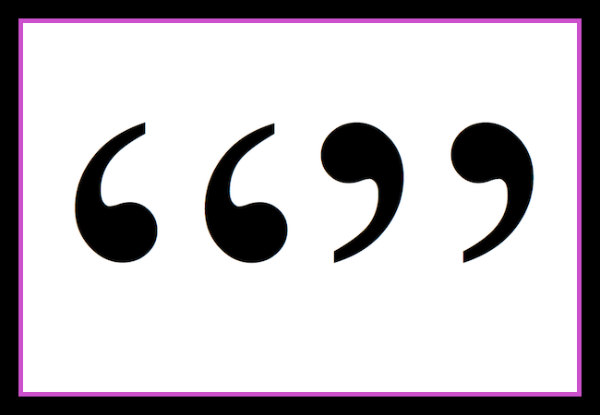This post may include Amazon links. As an Amazon Associate I earn from qualifying purchases.
The Lovely, but Increasingly Lowly Quotation Marks

I’m going to jump right in and state that as an avid reader I am a HUGE fan of quotation marks. This lovely little form of common punctuation has been in print since the sixteenth century and (in the unlikely event that any of you are from another planet) is defined by Webster’s as follows:
quo-ta-tion mark – either of a pair of punctuation marks (“……”) used to enclose a direct quotation, or of single marks (‘…..’) for enclosing a quotation within a quotation.
Quotation marks are a very simple concept used by writers to make it clear to readers when a character in a story is speaking. For many years, certain writers have opted not to use quotation marks, most notably James Joyce, Samuel Beckett, Cormac McCarthy, E.L. Doctorow, and Charles Frazier, to name a few. These are all writers of great literature whom I admire. I’ve done a little research and found many reasons for their (and others) abandonment of quotation marks.
- Some say that writing without quotation marks is more elegant and claim it actually makes it easier for the reader.
- Others claim that it’s the writer’s intent to blur the lines between dialogue and description, allowing the reader to develop their own meaning from the text.
- L. Doctorow once claimed that if a writer knows what he is doing, quotation marks aren’t really necessary. “You can tell when it’s dialogue.”
- To some it has a more natural feel and looks cleaner on the page.
- Eliminating quotation marks forces the reader to consider the writer’s prose with greater care.
Doctorow, has a point, you can tell when it’s dialogue…..when it’s done very well. Unfortunately, it’s not always done that well. So, for writers considering jumping on the no quotation mark bandwagon let me give a few reasons for you to reconsider.
- A book without quotation marks can be immediately annoying. Sure, if it’s great enough it doesn’t take long to get past the annoyance, but if it’s not quite there…???
- If the reader is struggling and needs to go back again and again to determine the author’s intent, then they’re more likely to take a pass on what might otherwise be a great book. Don’t put that added burden on the reader.
- It’s not the reader’s job to decide which words are spoken and which are not. That’s the writer’s job.
- Content in a novel may be difficult and complex at times and that can be a wonderful part of the story, but lack of punctuation should not add to that. It can shift the focus from the story to the mechanics. It asks a lot of the reader.
- You want to sell books!
Do I refuse to read a book without quotation marks? Absolutely not! Does it mean that the book has an extra hill to climb with me? Yes! I must really love the story early on to stay with the book. I will most certainly give up on a book more easily if the author chose not to use quotation marks. So, if the writer is good enough at it, I do indeed grow accustom to the lack of quotation marks, but not all writers experimenting with this “no quotation mark” trend are good enough at it.
In conclusion, to writers, consider carefully if you really want to head down this path. To readers, don’t give up on a book just because there are no quotation marks. There are writers who do it so skillfully you forget that quotation marks are missing, and you’re treated to a very special piece of literature!

I find the lack of quotation marks significantly reduces my enjoyment in reading the book. Yes, I can identify the dialogue, but inky after you have read part way into the sentence. You can read without any kind of punctuation marks, but they ad clarity when reading. I am not sure I can even finish this book, because it is driving me crazy.
I’ve gotten used to the lack of quotation marks, so it doesn’t bother me as much as it once did. No punctuation, however? UGH!
Very thorough, and easy to understand comments. Good examples provided.